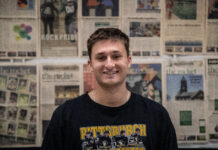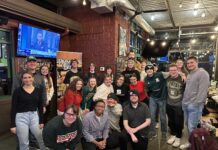Educating heterosexual students on the struggles LGBT+ students face is the first step in creating a safe and open community where LGBT+ individuals can fully express themselves. This is especially important in college, where students may be encountering LGBT+ individuals for the first time.
While faculty and select students have been given the opportunity to attend Safe Zone training, this option is not available for the majority of students on campus. Limiting education about LGBT+ individuals to select people does little to educate the community.
With this in mind, the President’s Commission on Gender Identity and Sexual Orientation (GISO) recently created an interactive workshop called LGBT 101 for SRU students to learn more about the LGBT+ community.
We at The Rocket feel like this is an important step in educating the student body, especially because the co-chairs have made large strides to educate a wide array of people on the difficulties faced by those who identify as part of the LGBT+ community.
Co-chairs of GISO Timothy Oldakowski and Deborah Schell created the program after an AVI director came to them and asked how to educate his staff better on the LGBT+ community.
This request alone shows the demand for such training, and that it is necessary since everyday students aren’t explicitly educated on the struggles of the LGBT+ community.
Safe Zone training is only offered annually, and is five hours long, while LGBT+ 101 is offered on request and is two hours long. So if the training doesn’t stick or there are things they don’t get to cover, they can request to undergo the workshop again, something that can’t happen with Safe Zone training.
LGBT+ 101’s purpose is to provide students with information about LGBT+ terminology, and to discuss privileges heterosexuals have that LGBT+ people do not. Co-director Schell also said the workshop it is very interactive, something that may have been lacking in traditional Safe Zone training.
LGBT+ 101 also has a list of rules for its workshop, including a ban on cell phones, keeping personal informationconfidential and sharing the floor so that everyone has the opportunity to talk.
The workshop participants are encouraged to laugh and ask questions. Participants are also told that it is okay if they change their original stances on the program
This kind of environment not only encourages students to relate this education back to their real-life experiences, but also makes talking about LGBT+ issues more commonplace.
By making it normal to talk about these issues, SRU will become a more educated and inclusive environment overall.







As the coordinator of Safe Zone, I would like to clarify the purpose of Safe Zone. Safe Zone is not meant to be a tool to educate mass amounts of people on LGBT people. It is meant to educate those who want to provide services and resources to the LGBT community on campus. It is a much more intensive form of training that the LGBT 101 program and goes into much deeper issues concerning the LGBT community so that those who are trained are educated to provide those services. Safe Zone is primarily for faculty, staff, and student leaders (of which are not included in many Safe Zones throughout the US). Safe Zone is interactive as well and is offered twice a year and people can take (and have taken) Safe Zone as often as they like. So, please write the facts as they are and speak to those involved in other programs before you write a piece that gives inaccurate information. Thank you.